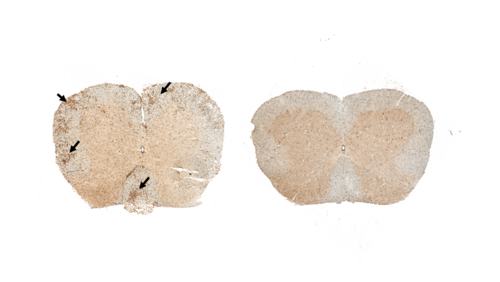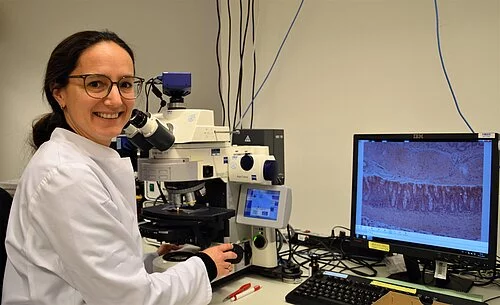Intestinal bacteria could influence the development of multiple sclerosis
A tryptophan-free diet in mice changes the composition of the intestinal bacteria and protects against symptoms of experimentally generated multiple sclerosis
Tryptophan is an essential amino acid, i.e. a protein component which cannot be produced by the body itself, but must be obtained from the diet. Metabolic products of tryptophan serve as chemical messengers for numerous important bodily functions. They control specific immune cells, for example, or help to strengthen the intestinal barrier. A diet which specifically omits tryptophan alters the composition of the intestinal bacteria in mice, and surprisingly results in the animals not developing symptoms of multiple sclerosis (MS). This has been demonstrated by scientists from the Cluster of Excellence "Precision Medicine in Chronic Inflammation" at the Institute of Clinical Molecular Biology (IKMB) at Kiel University (CAU), in cooperation with the German Cancer Research Center (Deutsches Krebsforschungszentrum, DKFZ) in Heidelberg. The researchers recently published their work in the renowned scientific journal Nature Communications.
Multiple sclerosis (MS) is a chronic inflammatory neurodegenerative disease of the central nervous system. With MS, the own immune system attacks the insulation of nerve fibers in the central nervous system, and gradually destroys them. This disturbs the transmission of signals in the nerves. Over time, these changes can disrupt the motor functions or sensory perception of those affected. Previous studies suggested that a combination of genetic predisposition and environmental factors causes the disease.
The research by Dr. Maren Falk-Paulsen and Professor Philip Rosenstiel from the Institute of Clinical Molecular Biology (IKMB) at Kiel University (CAU), in cooperation with a team led by Professor Michael Platten from the DKFZ in Heidelberg, shows that the intestinal microbiome, i.e. the totality of the bacteria in the gut, could also play an important role. They used a mouse model of multiple sclerosis, in which the body's own immune cells attack a specific envelope protein of the nerve insulation in the central nervous system, and thereby cause typical MS symptoms. However, mice that received a special diet in which the amino acid tryptophan was missing, did not develop any MS symptoms in this model. In these mice, the aggressive immune cells did not enter the spinal cord. This protective effect was dependent on the presence of certain bacteria in the gut - if these were missing, then the protection against MS also disappeared.
"By omitting the amino acid tryptophan, the composition of the intestinal bacteria changes, which sends a so far unknown signal to the immune cells. We do not yet know which mechanisms are behind this phenomenon. We want to examine this more closely in future," said Dr. Maren Falk-Paulsen, researcher at the IKMB and member of the Cluster of Excellence PMI.
Scientists from the Cluster of Excellence PMI at the IKMB led by Professor Philip Rosenstiel have already been researching how tryptophan influences the intestinal microbiome and chronic inflammation for a long time. "In previous work, we have been able to show how tryptophan affects inflammations in the gut," explained Professor Rosenstiel, director at the IKMB and board member of the Cluster of Excellence PMI. "Now we have shown that the omission of tryptophan also affects inflammatory reactions in other parts of the body, and this via a mechanism independent of the previously known signaling pathways. Based on our results, we hope to find a new target for treating MS in future," added Rosenstiel.
Original publication:
Jana K. Sonner*, Melanie Keil*, Maren Falk-Paulsen*, …, Philip Rosenstiel & Michael Platten: Dietary tryptophan links encephalogenicity of autoreactive T cells with gut microbial ecology. Nature communication (2019). (*The authors contributed equally to the publication) DOI: 10.1038/s41467-019-12776-4
Scientific contact
Dr. Maren Falk-Paulsen
Institute of Clinical Molecular Biology (IKMB), CAU, UKSH
+49 (0)431 500 15133
m.paulsen@ikmb.uni-kiel.de
Prof. Dr. Philip Rosenstiel
Institute of Clinical Molecular Biology, CAU, UKSH
+49 (0)431 500 15111
p.rosenstiel@mucosa.de
In mice with MS symptoms, the spinal cord is severely inflamed. This becomes clear under the microscope, through the detection of specialized inflammatory cells (image on the left, in dark brown and marked with arrows). A tryptophan-free diet prevents this infiltration of inflammatory cells into the spinal cord (image on the right).
Dr. Maren Falk-Paulsen, member of the Cluster of Excellence "Precision Medicine in Chronic Inflammation" (PMI) and researcher at the Institute of Clinical Molecular Biology (IKBM), CAU, UKSH.
About the Cluster of Excellence PMI
The Cluster of Excellence "Precision Medicine in Chronic Inflammation" (PMI) is being funded from 2019 to 2025 through the German Excellence Strategy (ExStra). It succeeds the "Inflammation at Interfaces” Cluster, which was already funded in two periods of the Excellence Initiative (2007-2018). Around 300 members from eight institutions at four locations are involved: Kiel (Kiel University, University Medical Center Schleswig-Holstein (UKSH), Muthesius University of Fine Arts and Design, Kiel Institute for the World Economy (IfW), Leibniz Institute for Science and Mathematics Education (IPN)), Lübeck (University of Lübeck, University Medical Center Schleswig-Holstein (UKSH)), Plön (Max Planck Institute for Evolutionary Biology) and Borstel (Research Center Borstel - Leibniz Lung Center).
The goal is to translate interdisciplinary research findings on chronic inflammatory diseases of barrier organs to healthcare more intensively, as well as to fulfil previously unsatisfied needs of the patients. Three points are important in the context of successful treatment, and are therefore at the heart of PMI research: the early detection of chronic inflammatory diseases, the prediction of disease progression and complications, and the prediction of individual responses to treatment.
Press office
fbuhse@uv.uni-kiel.de+49 (0)431/880 4682 https://precisionmedicine.de
Cluster of Excellence "Precision Medicine in Chronic Inflammation"
Scientific Office
Head: Dr. habil. Susanne Holstein Postal
Christian-Albrechts-Platz 4, 24118 Kiel, Germany
Contact: Sonja Petermann
+49 (0)431 880-4850, fax: +49 (0)431 880-4894
spetermann@uv.uni-kiel.de
Twitter: PMI @medinflame







